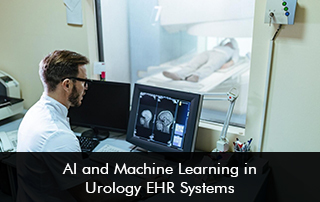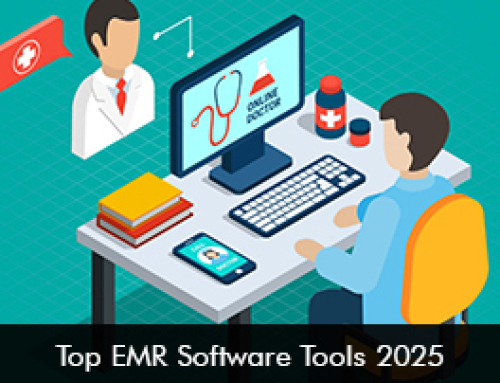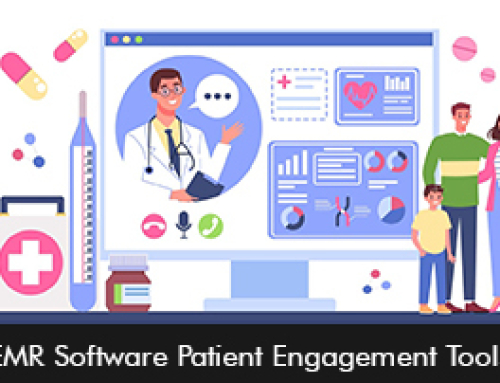Urology, like many other medical specialties, has seen a dramatic shift in how care is delivered—largely thanks to the rise of Electronic Medical Records (EMR) and Electronic Health Records (EHR) software. What used to involve piles of paper charts and manual tracking is now handled through intuitive, digital systems that not only keep everything organized but also help urologists make faster, better-informed decisions by putting lab results, scans, and full patient histories right at their fingertips.
As we navigate through 2025, the integration of Artificial Intelligence (AI) and Machine Learning (ML) into urology-specific EHR systems is revolutionizing the field, offering unprecedented efficiency and accuracy in diagnostics and treatment planning.
The Impact of AI and Machine Learning in Urology EHR Systems
-
Enhanced Diagnostic Accuracy:
AI algorithms can analyze vast datasets to identify patterns that may be imperceptible to the human eye, aiding in the early detection of urological conditions such as prostate cancer and urinary tract infections.
-
Predictive Analytics:
Machine learning models can predict patient outcomes based on historical data, allowing urologists to tailor treatment plans proactively and improve patient prognoses.
-
Automated Workflow Optimization:
AI-powered EHR systems can automate routine tasks, such as appointment scheduling and follow-up reminders, freeing up valuable time for healthcare providers to focus on patient care.
-
Natural Language Processing (NLP):
NLP capabilities enable the extraction and structuring of information from unstructured clinical notes, facilitating better data organization and retrieval.
-
Integration with Wearable Technology:
Modern EHR systems can sync with wearable devices that monitor patient vitals, providing real-time data that can be analyzed using AI to detect anomalies and prevent complications.
Key Features of Advanced Urology EHR Software
-
Specialty-Specific Templates:
Pre-built templates tailored for urology streamline documentation, covering common procedures and conditions such as cystoscopies, vasectomies, and urinary incontinence assessments.
Seamless integration with laboratories and imaging centers allows for quick access to test results, enhancing diagnostic efficiency.
-
Telemedicine Capabilities:
With the rise of remote consultations, integrated telemedicine features enable urologists to consult with patients virtually, expanding access to care.
-
Patient Portal:
Secure portals empower patients to access their medical records, schedule appointments, and communicate with their healthcare providers, fostering engagement and adherence to treatment plans.
-
Compliance and Security:
Robust security measures ensure compliance with regulations such as HIPAA, safeguarding sensitive patient information against breaches.
Top Recommended Urology EHR Software
-
Praxis EMR:
Renowned for its AI-driven adaptive learning capabilities, Praxis EMR offers a customizable interface that learns from user interactions to enhance efficiency. Its template-free design allows for personalized documentation, making it a favorite among urologists seeking flexibility.
-
eClinicalWorks:
This comprehensive EHR solution provides urology-specific modules, including integrated practice management and revenue cycle management tools. Its interoperability ensures seamless data exchange between different healthcare systems, promoting coordinated care.
-
Athenahealth:
Athenahealth offers cloud-based EHR and practice management solutions with robust patient engagement tools. Its intuitive interface and real-time updates facilitate efficient clinical workflows, while its billing module streamlines financial operations.
-
DrChrono:
Known for its user-friendly design, DrChrono provides customizable templates and integrates with various medical devices. Its mobile compatibility allows urologists to access patient records and manage appointments on-the-go, enhancing flexibility and responsiveness.
-
AdvancedMD:
This platform combines EHR, practice management, and patient engagement functionalities. Its advanced reporting and analytics tools provide insights into practice performance, aiding in strategic decision-making and operational efficiency.
The fusion of AI and machine learning with urology EHR systems is transforming the landscape of urological care. By automating routine tasks, enhancing diagnostic accuracy, and facilitating personalized treatment plans, these technologies are empowering urologists to deliver superior patient outcomes. As the digital evolution continues, embracing these advanced EHR solutions will be pivotal for practices aiming to stay at the forefront of urological healthcare.








